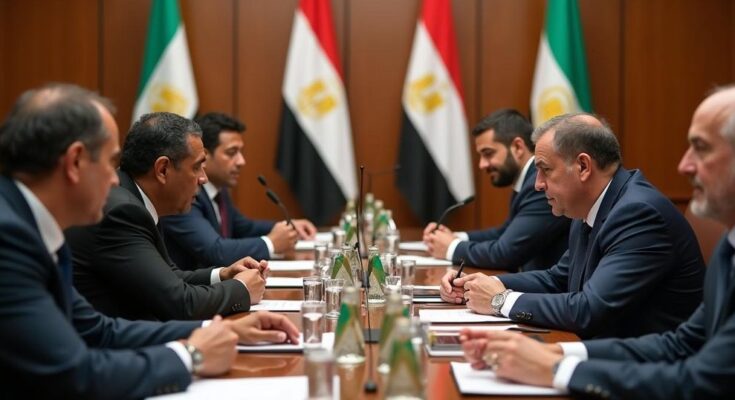Leaders from Eritrea, Egypt, and Somalia have strengthened ties to form a collaborative front against Ethiopia amid rising tensions over territorial and regional disputes. This summit led to military cooperation commitments, particularly concerning Somalia’s internal security challenges, reflecting a significant shift in regional alliances.
In a significant geopolitical development, the leaders of Eritrea, Egypt, and Somalia convened in Asmara, the capital of Eritrea, to strengthen their collaborative stance against Ethiopia. This summit concluded with a declaration emphasizing “respect for the sovereignty… and territorial integrity of the countries in the region,” which may implicitly address Ethiopia’s aspirations for maritime access without mentioning it directly. Relations between Somalia, Egypt, and Eritrea have intensified, largely in response to diplomatic tensions, especially following Somalia’s discontent over Ethiopia’s recent agreement with Somaliland regarding coastline access. With Somalia feeling aggrieved, it has found common ground with Egypt and Eritrea, both of whom have longstanding grievances against Ethiopia. Hassan Khannenje, the director of the Horn International Institute for Strategic Studies, remarked on the assembly as an “axis against [Ethiopian capital] Addis Ababa,” suggesting that the concerted efforts of these nations may increase pressure on Ethiopia. Photographs from the meeting captured Eritrean President Isaias Afwerki joining hands with Egyptian President Abdul Fattah al-Sisi and Somali President Hassan Sheikh Mohamud, reinforcing their unified front. They committed to bolster Somali state institutions to tackle both internal and external challenges, particularly enhancing the Somali National Federal Army’s capacity to combat terrorism. Notably, this summit marks President Sisi’s inaugural visit to Asmara, amidst several visits by President Mohamud within the same year. Meanwhile, Ethiopia has historically supported Somalia in its battle against al-Shabaab militants. However, growing tensions stem from Ethiopia’s plans for port access and its controversial agreement with Somaliland, which claims to be an independent territory of Somalia. The decade-long discord between Ethiopia and Egypt has been fueled by Ethiopia’s construction of a hydroelectric dam on the Nile River, which Egypt fears threatens its water supply. Recently, military cooperation has been observed, with Egyptian vessels delivering military equipment to Somalia, highlighting the growing alliance between the three nations against a common adversary. The relations between Ethiopia and Eritrea, previously thought to have mended post a peace declaration by Ethiopian Prime Minister Abiy Ahmed in 2018, have unfortunately soured again. After the two-year civil conflict in Ethiopia’s Tigray region, ties have become strained, especially with Ethiopia’s ambitions to secure Red Sea access exacerbating tensions.
The geopolitical landscape in the Horn of Africa has been characterized by a complex interplay of alliances and tensions, particularly involving Ethiopia, Eritrea, Egypt, and Somalia. Historical grievances and recent diplomatic disputes have led to evolving relationships between these nations. Following years of conflict, Eritrea and Ethiopia had momentarily improved relations with the 2018 peace agreement; however, escalating tensions in the region have rekindled hostilities. Ethiopia’s ambitions for greater access to port facilities and its latest agreements with self-declared Somaliland have invoked strong reactions from Somalia, which insists on the latter’s territorial claims. Simultaneously, the long-standing dispute over the Nile River’s hydroelectric developments continues to strain Egypt-Ethiopia relations, further complicating regional dynamics.
The recent summit held by the leaders of Eritrea, Egypt, and Somalia marks a pivotal moment that signals a potential axis against Ethiopia in the Horn of Africa. The meeting was underscored by a clear intention to address perceived threats to sovereignty and territorial integrity while consolidating military cooperation against common issues, particularly terrorism. These developments reflect growing unease regarding Ethiopia’s regional ambitions and highlight the complexities of evolving alliances in a historically conflict-ridden area.
Original Source: www.bbc.com




